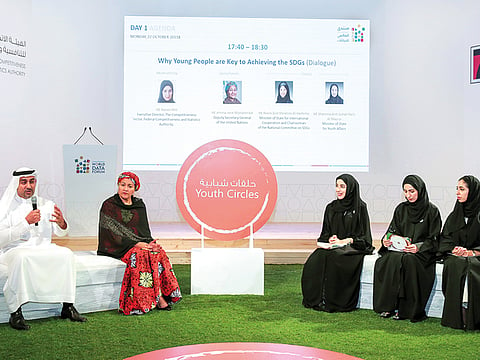‘Youth Council of the Global Agenda 2030’ launched at UN Data Forum
The initiatives highlights the importance of youth in achieving Sustainable Development Goals

Dubai- The Federal Competitiveness and Statistics Authority (FCSA) announced on Tuesday the launch of the ‘Youth Council of The Global Agenda 2030’ during the United Nations World Data Forum 2018 taking place at Madinat Jumeirah, Dubai.
The announcement came on the sideline of a session titled ‘Why the youth’s role is central in achieving Sustainable Development Goals (SDGs),’ held in the presence of Shamma Suhail Faris Al Mazroui, Minister of State for Youth, Amina J. Mohammad, Deputy Secretary-General of the United Nations, and Abdullah Nasser Lootah, Director General of the FCSA and Chairman of the Organising Committee of the United Nations World Data Forum 2018.
The initiative is aimed at supporting the UAE in its efforts to adopt a proactive approach to addressing future challenges through highlighting the essential role of Arab youth in development and in achieving the SDGs.
“The launch of this platform that adopts a global approach comes in line in line with the country’s goal to meet the SDGs under the UN’s Agenda 2030. This initiative is a huge support for decision-makers and helps them in their quest to create a positive change and to tackle the most important issues being faced across the world,” said Al Mazroui.
She pointed out that the launch of the Youth Council of The Global Agenda 2030 is a reflection of the UAE’s well-established approach to provide a supportive environment that motivates young people to make the most of their potential and creative talents. “This commitment contributes to the development of the next generation of leaders who can enhance the UAE’s position on international competitive indicators across all sectors and fields,” added Al Mazroui.
Council targets 15-35 age group
The FCSA cooperates with the Federal Youth Foundation in targeting youth membership in the Council for the 15 to 35 age group.
Its selection of an equal number of men and women supports the fifth goal of sustainable development, which is gender balance. The launch of the council coincides with the launch of the United Nations strategy to engage young people in achieving the goals of sustainable development ‘Youth 2030’ as a basis for development and the future and as an effective factor in following up the most important issues related to the lives of young people, with a focus on SDGs.
The architects of the council say that it is a platform that represents an interactive and innovative space under which government and youth decision-makers form a central pillar in policy-making, strategic plans and the development of government legislation that is supportive of the younger generation. They highlight that it will serve as an effective youth model for other Arab and foreign countries to replicate.
Meanwhile, Lootah said the UAE supports young people and equips them with the skills they need to face the challenges of the future. “It does this by adopting the latest technologies and solutions to collect data, information and statistics that give a clear and accurate understanding of each stage and which contribute to the strategies that are aimed at building a better future for generations to come,” he said.
Similarly, Amina J. Mohammad emphasised on the pivotal role that young people play in achieving the Sustainable Development Goals 2030.
“The youth are the largest age group around the world; they possess massive potential to lead the efforts for sustainable development. The future we look forward to is theirs, therefore, their role should not be limited to simply participating in the decision-making process, but rather to make the decisions that best suit their capacity for creativity and forecasting the future,” she said.
Sign up for the Daily Briefing
Get the latest news and updates straight to your inbox



